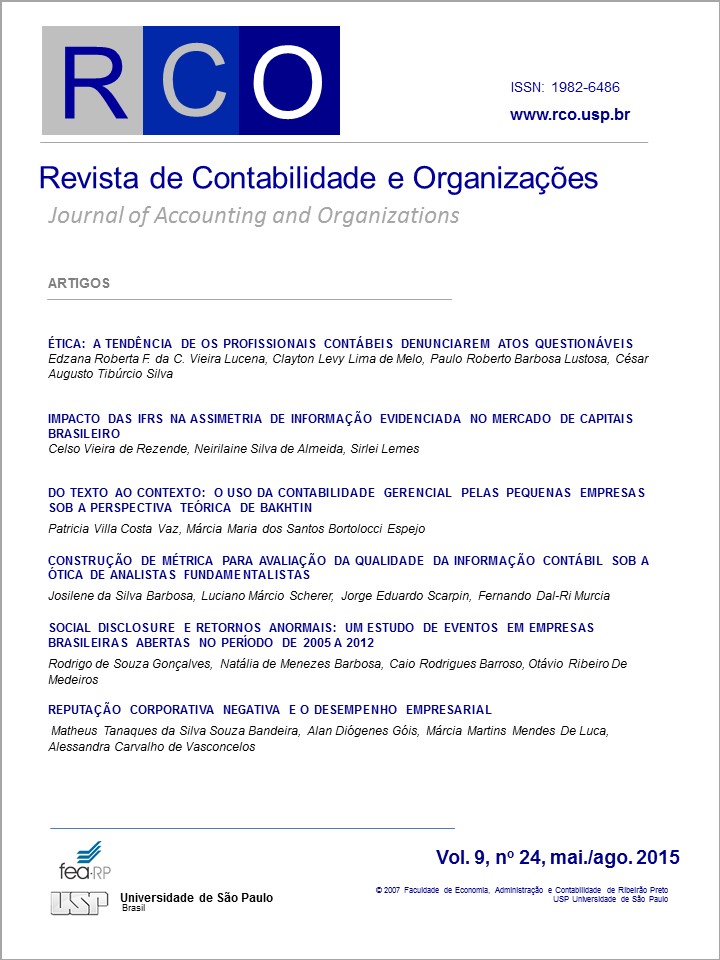DO TEXTO AO CONTEXTO: O USO DA CONTABILIDADE GERENCIAL PELAS PEQUENAS EMPRESAS SOB A PERSPECTIVA TEÓRICA DE BAKHTIN
DOI:
https://doi.org/10.11606/rco.v9i24.69215Palavras-chave:
Contabilidade Gerencial, Comunicação, Bakhtin, Pequenas EmpresasResumo
O presente artigo tem por objetivo analisar a compreensão do interlocutor a respeito da Contabilidade Gerencial sob a perspectiva teórica de Mikhail Bakhtin sobre a formação do discurso. Bakhtin é um linguista russo que dedicou sua vida à compreensão da comunicação humana, e neste artigo será realizada uma reflexão da Contabilidade Gerencial e seu uso nas pequenas empresas. Desta maneira, o conhecimento do interlocutor (gestor da pequena empresa) sobre a linguagem específica da ciência facilita a compreensão e fornece um caráter maior de utilidade à Contabilidade. Ao final do presente artigo, verificou-se a aplicação das teorias de Bakhtin na Contabilidade Gerencial, pois, além de se compreender como ocorre a formação dos enunciados e dos significados no discurso, analisa-se que o usuário da informação contábil possui papel fundamental no desenvolvimento dos relatórios. Assim, o conhecimento do interlocutor, suas necessidades, seu nível de compreensão e seus objetivos, definem a forma como a comunicação será desenvolvida para ser eficaz.
Downloads
Publicado
Edição
Seção
Licença
A RCO adota a política de Acesso Livre (Libre Open Access), sob o acordo padrão Creative Commons (CC BY-NC-ND 4.0). O acordo prevê que:
- A submissão de texto autoriza sua publicação e implica compromisso de que o mesmo material não esteja sendo submetido a outro periódico. O original é considerado definitivo;
- Autores mantêm os direitos autorais e concedem à revista o direito de primeira publicação, com o trabalho simultaneamente licenciado sob a Licença Creative Commons Attributionque permite o compartilhamento do trabalho com reconhecimento da autoria e publicação inicial nesta revista;
- Autores têm autorização para assumir contratos adicionais separadamente, para distribuição não-exclusiva da versão do trabalho publicada nesta revista (ex.: publicar em repositório institucional ou como capítulo de livro), com necessário reconhecimento de autoria e publicação inicial nesta revista;
- Autores têm permissão e são estimulados a publicar e distribuir seu trabalho online (ex.: em repositórios institucionais ou na sua página pessoal) antes ou durante o processo editorial, já que isso pode gerar alterações produtivas, bem como aumentar o impacto e a citação do trabalho publicado (Veja O Efeito do Acesso Livre);
- A revista não paga direitos autorais aos autores dos textos publicados;
- O detentor dos direitos autorais da revista, exceto os já acordados no acordo de Libre Open Access (CC BY-NC-ND 4.0), é o Departamento de Contabilidade da Faculdade de Economia, Administração e Contabilidade de Ribeirão Preto da Universidade de São Paulo.
Não são cobradas taxas de submissão ou de publicação.
São aceitos até 4 autores por artigo. Casos excepcionais devidamente justificados poderão ser analisados pelo Comitê Executivo da RCO. São considerados casos excepcionais: projetos multi-institucionais; manuscritos resultantes da colaboração de grupos de pesquisa; ou que envolvam grandes equipes para coleta de evidências, construção de dados primários e experimentos comparados.
É recomendada a ordem de autoria por contribuição, de cada um dos indivíduos listados como autores, especialmente no desenho e planejamento do projeto de pesquisa, na obtenção ou análise e interpretação de dados e redação. Os autores devem declarar as efetivas contribuições de cada autor, preenchendo a carta ao editor, logo no início da submissão, responsabilizando-se pelas informações dadas.
É permitida a troca de autores durante todo o processo de avaliação e, antes da publicação do manuscrito. Os autores devem indicar a composição e ordem final de autoria no documento assinado por todos os envolvidos no aceite para publicação. Caso a composição e ordem de autoria seja diferente da informada anteriormente no sistema, todos autores anteriormente listados deverão se manifestar favoráveis.
No caso de identificação de autoria sem mérito ou contribuição (ghost, guest or gift authorship), a RCO segue o procedimento recomendado pela COPE.








